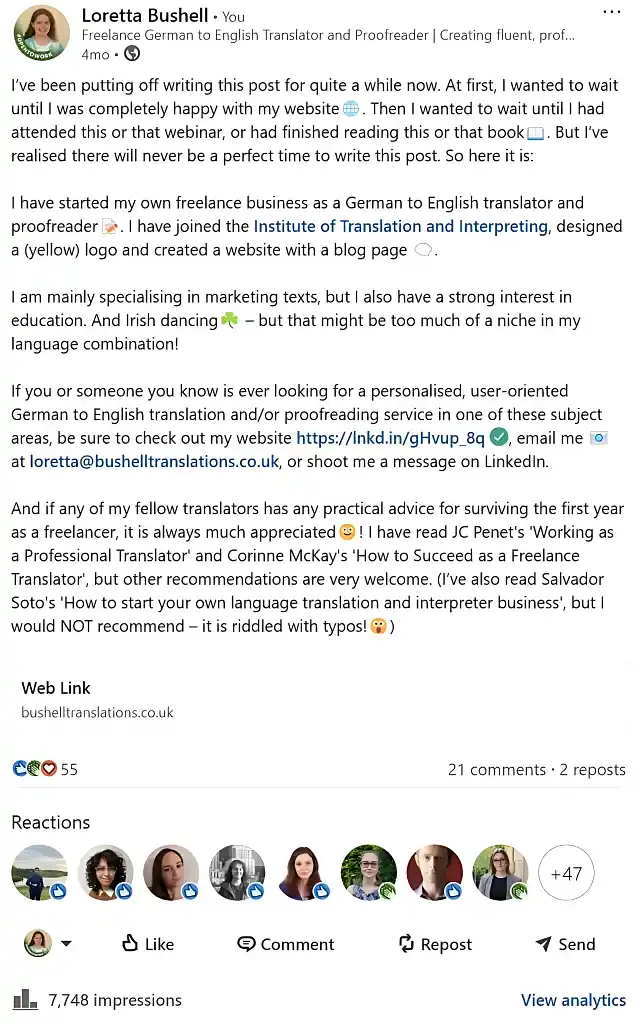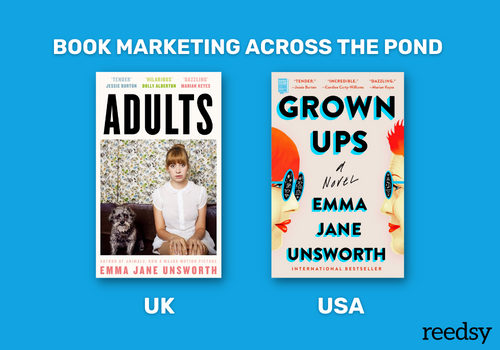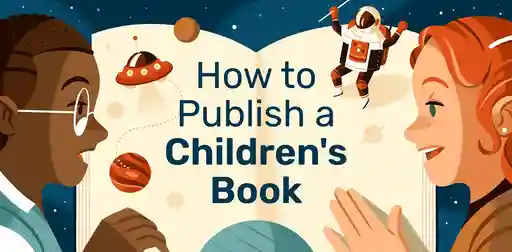Blog • Understanding Publishing
Posted on Mar 24, 2025
How to Make Money Writing in 2025
Loretta Bushell
Loretta is a writer at Reedsy who covers all things craft and publishing. A German-to-English translator, she specializes in content about literary translation and making a living as a freelancer.
View profile →Ricardo Fayet
Reedsy co-founder and Chief Marketing Officer, Ricardo Fayet has worked with hundreds of authors on their launches and marketing campaigns. He is the author of two bestselling guides on marketing for authors, and a regular presenter at the largest writers' conferences.
View profile →Do you fantasize about earning all your money from writing? I’m here to tell you how to make that a reality. Sure, you may not end up as rich as J.K. Rowling, but it’s perfectly possible to make a living writing. After all, I do it!
The secret to making money as a writer is to activate more than one income stream. Most authors, for example, don’t live solely off royalties but supplement their income with other writerly activities. Some of these are directly related to their works, but others aren’t — meaning it’s also possible to make a living writing without ever publishing a book!
Does this sound too good to be true? I promise it’s not. Here are seven ways to monetize your writing skills, along with a (rough) indication of how much money you can make from them:
1. Land a job in content writing
A steady income, regular hours, and a new writing project every day — this is my life as a full-time content writer. If you love learning and appreciate the stability of a 9 to 5 job, this might be the perfect role for you. On a day-to-day basis, you’ll be researching, planning, and writing articles, blog posts, and web content on a range of topics — so you’re constantly discovering new things and, if you’re like me, struggling against the temptation to fall down Wikipedia rabbit holes!
To land an entry-level position in content writing, you’ll need to demonstrate good research and writing skills, even if it’s only through a personal blog or student newspaper. Along with the ability to use your initiative, these are the top qualities we look for in our content marketing interns at Reedsy. We are currently hiring interns to work from home — or you can search job sites for opportunities near you.
How much will you get paid? According to Payscale, entry-level content writers in the US can expect to earn at least $30k per year, while the average salary across all US content writers is $56k.
2. Find freelance writing gigs
If you value more flexible working conditions (and you’re not afraid of self-employed taxes!), you might want to become a freelance writer instead — or as well! In addition to working for Reedsy, I’m also a freelance German-to-English translator, which brings me the best of both worlds: a guaranteed base income and the freedom to pick and choose translation projects I’m really passionate about.
It’s not just me who lives this double life! My colleague Rebecca, for example, is a marketer as well as the author of two books. Many of the ghostwriters on our marketplace are authors too, and book coaches double up as ghostwriters or editors. Multiple income streams don’t just increase your earnings — they also make for a more fulfilling career.
Speaking of variety, there’s a whole host of diverse opportunities for freelance writers. In addition to content writing, you can try your hand at copywriting — crafting persuasive promotional material for marketing purposes. In fact, you can write almost anything you want: instruction manuals, business reports, speeches, and newspaper columns are just a handful of things that are often outsourced to freelancers.
Depending on the format and subject area, you can expect to earn $0.10-$0.15 per word at the beginning of your career. Of course, if you’re already an established writer when you take up freelancing, you’ll be able to charge more.
To kick off your freelance career, you’ll need a portfolio, basic business skills, and a good dose of patience. It takes time to earn a name for yourself, but once you have regular clients and a few strong testimonials, you can reap the benefits of setting your own working hours, processes, and even rates.
Here’s how you can find those initial clients and build your reputation:
Create an account on freelancer platforms
There are many websites where you can apply for freelance writing opportunities. Some of these have stricter acceptance criteria than others — and some of them (e.g., Upwork, Freelancer.com) offer notoriously low rates of pay.
However, as you build experience and collect testimonials from satisfied clients, you’ll be able to set higher rates and access jobs on more prestigious platforms, like Contently and ProBlogger.
Network directly with clients and colleagues
You won’t find the most prestigious jobs on any freelancer platform. High-end clients are more likely to hire writers based on word-of-mouth referrals. Therefore, it can be worth taking the time to grow your professional network and remain active on social media channels.
For my translation business, I use LinkedIn to build relationships with other translators and clients. Even though I cringe at my own posts, they have led to new professional relationships and subsequently to paid work.
My first LinkedIn post was the most cringe of all — but it reached thousands of people and got me my first interesting project: a new contact had been asked to translate some press releases for a Berlin theater, but didn’t have time to do it herself and passed the work on to me.

Here are my top two tips for networking on LinkedIn:
- ❓Ask a question at the bottom of your posts. Not only do you learn from other people’s answers, but their comments will appear in their network’s feeds, so it exposes your post to more people.
- 💬 Comment on other people’s posts regularly. Try to comment on influential freelancers’ posts so that people in your industry get used to seeing your name. Eventually, they might decide it’s worth adding you as a connection.
Pitch guest posts to magazines and blogs
You can also pitch ideas for articles directly to magazines, blogs, etc. that interest you. Usually, this involves sending an email or filling out a form on their website.
To increase your chance of getting a response, make sure you:
- Address the editor by name.
- Show that you have researched the specific publication or website.
- Highlight why you’re the best person to write the article(s).
- Send multiple pitches, so you have a better chance of getting a “yes”.
You can attach an outline or a sample of your writing, but don’t write a full article until you receive the go-ahead from the editor.
3. Monetize your blog or newsletter
If you want the freedom to decide for yourself what is and isn’t worth publishing, you can start your own blog or newsletter, where you will retain full creative control. This is a good way to bulk out your writing portfolio and keep yourself at the top of people’s minds. Again, LinkedIn is an excellent platform to share your work on — but also Instagram and other social media networks.
Once you’re confident there’s an audience out there who will pay for your content, you can directly monetize your blog or newsletter by charging a subscription fee on Substack or Patreon. If you have 100 subscribers on Substack, each paying $5 per month, your monthly income will be $406 after the site's fees. Of course, you’ll have to make sure you maintain the quality and frequency of posts that you promise your subscribers.
If, like me, you don’t have enough time to put that level of effort into your blog on top of all your other income streams, you can keep it free to users and still earn some money (admittedly not a lot) in other ways:
- 🎁 Offer bonus paid content. Instead of a subscription, offer readers valuable additional content such as “bonus” blog posts that are lengthier or more personal, video tutorials, one-on-one consultations, etc. for a one-time payment. Your blog or website host may have the option to create a store where you can sell these products, or you can set up an account on Gumroad, Payhill, or Sellfy.
- 🔗 Promote affiliate links. Include affiliate links to products or services in your content and receive a commission (typically 5-30% of the sale price) for each reader that clicks through and makes a purchase. You can join large affiliate programs like Amazon, Etsy, Shopify, etc., but you can also reach out to local businesses or SMEs that sell highly relevant products or services.
- ⚖️ Get paid to review products from sponsors. This is a good moneymaker once you have a large enough following in a certain niche. If you do land sponsorships, it’s essential to be honest about the positives and negatives of the products you review; otherwise, the insincerity will come across to readers and damage your reputation! One way to avoid this is to mainly seek sponsorship from companies you already believe in, rather than letting random companies come to you.
Q: What website builder and hosting would you recommend?
Suggested answer
This is not a one-size-fits-all answer. Many factors go into choosing the right platform for your website. However, to answer the question straight:
- For complete control, I use and recommended WordPress + Avada on WP Engine. Alternatives to this could be WordPress + Elementor or WordPress + Divi on another host that specialized in WordPress, aka Managed WordPress hosting. (Avoid GoDaddy for anything but domain names.)
- If you want more out-of-the-box but less control, you can go with a DIY builder like Squarespace or WIX. These are capable of handle most features authors needs.
- I advise against Weebly, as they have fallen behind.
Every web designer has an opinion on this, but the truth is, if we're talking about standard author websites, most website/web design platforms and hosts are capable of achieving what's necessary. It comes down to the designer and their mastery of the platform chosen. The bottom line is:
- Is it mobile friendly?
- Is it SEO friendly?
- Does it load fast?
Besides that, deciding factors can include:
- How much customization do you require?
- How much of "web design basics" do you want to learn to maintain the content? Because no matter what, any DIY or drag-and-drop builder is going to have a learning curve for anyone unfamiliar with web design.
- How much do you want to pay monthly/annually?
This is a brief introduction on choose a website platform and host. There's a lot that goes into choosing, but don't over think it. They can all get the job done, as long as you have the right person at the helm.
Chad is available to hire on Reedsy ⏺
This all depends on what backend you're most comfortable with. Youtube has some great video tutorials for Wordpress/Squarespace/Wix, which will offer an overview of what it's like to create or update a page. That's where I'd start, as you want something that's easy for you to update.
Self-hosted Wordpress will give you the most control. This is especially important if you have 5+ books. Some designers can offer automation—meaning they can set the site up so you only have to add a new book page and the book's cover/info automatically appear everywhere it needs to across the site. (Double check with your designer to make sure they offer this.) Which is great if you have a long series or multiple books.
However, Wordpress doesn't have a default visual editor. (Some plugins/themes offer visual editing with mixed results.) Most hosting options are solid—look for free SSL, and if there's a limit on emails addresses or domain names/sites. Space is nice, but most sites don't hit 2gb (unless there are multiple sites and a separate store). 5gb is usually more than enough. It's nice to have the option for multiple sites, in case you want to have a separate store later (or a separate site for a pen name).
For specific host recommendations, I've had good luck with Hostgator, SiteGround, MDDHosting, and Inmotion. While Bluehost is often recommended online, it's been very slow this year (2024) especially for the price. I've heard good things about Cloudways, Hostinger, and A2 Hosting. Wordpress.com is also viable with their business plan, though it won't give you as much control as a standard host.
For page builders (visual editors), I tend to recommend Squarespace over Wix, as I find Squarespace more intuitive since Wix's update (introducing Studio) this past spring (2024). Page builders offer no automation, which means adding a new book can be a laborious process depending on where you want the book's info to appear. For example, if you only want the cover on the book page and the home page, that's only two pages to update. If you have a series and want each book in the series to have a "read more" section with the other books in the series, then you have to update the cover manually on each of the series' book pages. Not a big deal for a small library, but rather a pain for a larger one.
At baseline though, start with YouTube. Skim tutorials on what it's like to create/update a page on the platform you're interested in. This will give you a better sense of how the platforms operate. Whatever is easiest for you to operate is (almost) always the best option.
Tessa is available to hire on Reedsy ⏺
It’s also possible to sign up to an ad network and receive a few cents for each user that clicks on an advert — but I wouldn’t actually recommend it. People click on ads less and less these days, and they’re honestly quite annoying, so the small amount of income is rarely worth the sacrifices to the user experience.
4. Write your own books
It’s a big step up from writing a blog to authoring full-length books, but it’s one of those things that you’ll regret not doing if it’s always been a dream of yours.
The emotional reward of publishing a book is of course priceless, but let’s talk about the financial return. How much money you’ll make as an author depends not only on the success of your books, but also on whether you choose to self-publish or go through a traditional publisher.
Both have their pros and cons, but self-publishing tends to be more profitable because you get to keep a higher percentage of the royalties.
|
Self-published authors |
|
|
Small press authors |
|
|
Big 5 authors |
|
*Self-publishing figures based on Amazon KDP royalties.
It can be difficult to accurately predict how many copies you will sell, but there are definitely a few ways to maximize your earning potential — which I’ll cover below.
Write something marketable
If you’re writing as a hobby, you can write anything you like — but if you’re writing to make a living, you need to ensure there is an audience for your ideas. Research current trends in your genre and tailor your books to meet the target audience’s basic expectations.
This includes length and plot, but also quality. If you go down the self-publishing route, it’s still essential to work with an experienced editor who knows the ins and outs of the industry and can look at your manuscript from an unbiased perspective. Likewise, a professional book cover can bring in twice as many sales as an amateur one.
Hire an expert
Susannah W.
Available to hire
Skilled and creative editor with 15+ years' in non-fiction publishing, specialising in arts, culture, heritage, design and architecture.
Sean L.
Available to hire
Proofreader/editor for 11+ years, reader for 40+, and as a lifelong fan, horror is my go-to genre.
Barry T.
Available to hire
Multiple award-winning children's picture book editor for over 20 years, specialising in ages 2-6. Also an author of 15+ books for children.
Write in series
One of the best ways to sell more books is to write a series. For fiction, end the first book on a cliffhanger so that readers will want to buy the sequel — but aim to release it within a year and a half so they don’t forget what happened or lose enthusiasm for your story!
For nonfiction, a sequel could expand further on a topic or talk about the natural next step in a process. Stephen Covey followed his first book, The 7 Habits of Highly Effective People, with the natural next step: The 8th Habit: From Effectiveness to Greatness. Likewise, Simon Sinek’s first book is called, Start with Why: How Great Leaders Inspire Everyone to Take Action and his second book focuses in more detail on how to foster teamwork: Leaders Eat Last: Why Some Teams Pull Together and Others Don't.
When the latest installment in a series does come out, consider discounting the preceding books — or even making the first book free — to encourage new readers to give the series a go.
Publish your books in multiple formats
To increase sales, you want as many people as possible to have access to your books. Therefore you’ll want to offer them in print and e-book formats, and release them in multiple regions. To increase the chance of success in another country, you may wish to get your books “localized” to suit the new market.
💡Fun fact: British author Emma Jane Unsworth’s novel Adults was published as Grown Ups in the USA. Clearly, her publishers thought the difference mattered!

If one of your books is particularly successful, you could even pay to have it turned into an audiobook or translated into another language to reach even more readers.
Actively cultivate your fanbase
More fans = more sales of your next book. But “just” writing good books sadly isn’t enough to consolidate a fanbase. To keep yourself at the top of readers’ minds, you need to treat your books like a business. Build a strong online presence and make use of an author mailing list to continuously engage with fans.

FREE COURSE
How to Build Your Author Mailing List
Learn how to connect with your audience and sell more books with email.
5. Offer speaking engagements
Another way to connect with fans is in-person at speaking engagements. You might talk about your latest book at a store or library, give a writing workshop at a school or university, or even talk about your specialist subject area at a larger conference. In all of these cases, you can hype up your books and get your name out there — and if you’re lucky, make some money too.
💡Top tip: Create a free QR code online that links to your author website or mailing list and print it out on business cards to hand out to attendees.
Unfortunately, not all engagements are paid, but if you’re speaking at a larger event or one that aims to make a profit, you should always negotiate a fee — as a guide, the UK’s Society of Authors pays their speakers £300 ($388) for 90 minutes or £450 ($580) for 3 hours.
Even if you aren’t getting paid, make sure there’s something in it for you. Maybe you get access to the email addresses of those who sign up, or you’re allowed to sell your books to the attendees.
The more successful talks you give, the more likely you are to be hired by larger organizations that can afford to pay significant sums. For your first engagements, don’t wait to be asked; get in touch with local libraries, schools, festivals etc. to let them know you’re available. Then, publicize these events online, if possible with a quote from the organizer saying what a pleasure it was to have you.
You can also advertise your availability for engagements by adding a short line to your author website and email footer: “For speaking inquiries, contact me at [email address].”
6. Ghostwrite other people’s books
If fame (however localized) isn’t for you, you can always turn to ghostwriting. This is a lucrative job opportunity in which you write someone else’s book for them without getting any credit — in fact, you will usually have to sign a Non-Disclosure Agreement.
To become a ghostwriter, you’ll typically need a strong portfolio of credited work, either your own published books or an impressive background in freelance writing.
If you can prove you have the necessary skills and you’re willing to remain anonymous, you can earn tens of thousands of dollars per book! Specifically, the ghostwriters on Reedsy make about $0.35 per word on average — rising to $0.60 for nonfiction works.
|
Genre |
Average cost |
Average Word count |
Per word |
|
Action & Adventure |
$17,500 |
70k |
$0.25 |
|
Biographies & Memoirs |
$30,000 |
75K |
$0.40 |
|
Business & Management |
$33,000 |
60K |
$0.55 |
|
Contemporary fiction |
$28,000 |
70k |
$0.40 |
|
Fantasy |
$13,500 |
90K |
$0.15 |
|
Historical fiction |
$20,000 |
80k |
$0.25 |
|
Literary fiction |
$48,000 |
80k |
$0.60 |
|
Mystery & Crime |
$19,000 |
75k |
$0.25 |
|
Nonfiction (general) |
$48,000 |
80k |
$0.60 |
|
Romance |
$16,000 |
80k |
$0.20 |
|
Science Fiction |
$18,000 |
90K |
$0.20 |
|
Thriller & Suspense |
$22,500 |
90k |
$0.25 |
|
Women's Fiction |
$43,000 |
95k |
$0.45 |
|
Young Adult |
$15,000 |
60k |
$0.25 |
Q: What costs do ghostwriters have to consider when giving a quote to a prospective client?
Suggested answer
It took me awhile to decide on my rates when I began ghostwriting. Here are the costs and tother things I took into consideration.
- How many hours on average does it take you to write a novel from start to finish? Assuming you’ve written a few books, take a few minutes and do some math and figure out how long each one took you. If you aren’t the type to track your daily work, that’s fine: I’m sure you can still get a solid estimate here. How many months did it take? Include all the brainstorming and outlining time, not just the drafting. On average, how many hours did you write per day? Come up with a range, at the very least, so you have some numbers to work with.
- What do you consider to be a fair hourly rate? No one can decide this but you (if you've already Googled ghostwriting rates, you know they're all over the place). From there, I suggest using the numbers you figured out in #1 to come up with an average. For example: $75/hour, estimating 35 hours per every 10,000 words, works out to $2,625 per every 10,000 words. You *could* charge by the hour, as in hey, this is $75 per hour until the book is done...but from the client’s perspective, they just won’t have any idea as to what that final total will be, and neither will you! So I think it’s best to use your hourly average to calculate a fee, then base that fee on something more concrete like word count or page count.
- This is the trickiest part, and the reason (in my opinion) rates are all over the place. You have to figure out what ghostwriting this book is worth TO YOU. What do I mean by that?
- First, where’s the rest of your money coming from right now? Full time teaching job, freelance copywriting, driving for Uber, pulling shots at Starbucks - when you get your first client and you have to write a book on a deadline, what work are you going to have to cut down on over the next few months, and how much is that going to cost you?
- Second, and this is where we get really speculative: consider the creative work you will put into this book, and consider the fact that someone else will hold the copyright. You are a ghost. You may be credited, but there is no obligation to credit you. You will never receive royalties. This rate is IT.
I suggest that you not be too humble when setting your rates. I think the instinct when we’re first starting out in a new field is to discount our services, to undercut the competition. But when you do that you’re just undercutting yourself. Because you have written books. You might be new to ghostwriting novels, but you aren’t new to writing novels.
I hope that's helpful!
Michelle is available to hire on Reedsy ⏺
I've been ghostwriting through Reedsy for the last four years and off and on before that for clients I met through my own work. For me, there are three primary considerations for fiction:
- How much does the client have written on the novel?
- How much time will it take me to write the book?
- Does the idea intrigue me?
If I find the idea intriguing and the idea is all the client has, I usually propose a synopsis based on the 15 beats of storytelling. It runs around 35 pages and essentially provides a blueprint for writing the novel. I do this synopsis for my own work. It means that halfway through the writing, I won't have to toss out 100 pages because the story no longer works. With a synopsis that outlines the 15 critical beats of a story, the client can then either write the book herself or turn it over to the ghostwriter. The synopsis saves time and ultimately saves the client money.
For non-fiction, the consideration is different. It's helpful if the client presents an outline of the chapters, even if it's rough. If I have to spend hours on zoom with the client to hear a story, the cost is higher.
Sometimes, when a client says they don't have money to cover the price I'm asking, we negotiate. But in the end, the main consideration for me is time. Will it take me two months or six to write the book? When I take on a ghostwriting project, I put my own work on hold and focus on the client's project.
Trish is available to hire on Reedsy ⏺
You can find ghostwriting jobs in a few different ways:
- Write for people you know who have a story to tell, but lack the time or expertise to tell it.
- Market your ghostwriting business through social media pages and/or a website.
- Join The Association of Ghostwriters to network with other professionals and pick up useful tips and contacts.
- Once you’ve built a name for yourself, apply to become a Reedsy ghostwriter.

JOIN REEDSY
Find exciting new projects
We connect publishing professionals with our community of 1,500,000 authors.
💼
Wondering if you're ready to sign up to Reedsy?
Find out here! Takes 1 minute
7. Coach aspiring writers
Another role you can have on the Reedsy marketplace is book coach. Although you aren’t actually writing yourself, book coaching (or writing coaching in general) is an ideal way to monetize your expertise and inspire the next generation of writers. You’ll provide feedback on your mentee’s work, help them improve their writing, and generally share your insights and experiences in the writing industry.
Depending on the level of experience, the book coaches on Reedsy make anywhere from $60 to over $150 per hour — making it the best-paid occupation on this list.
So why aren’t we all book coaches? Two reasons. Firstly, coaching requires a whole new set of skills: communication, empathy, pedagogical skills etc. Just as not all footballers make good managers, not all writers make good writing coaches.
Secondly, you need to already have an excellent reputation as a writer. Professional football teams wouldn’t hire a manager who didn’t have an impressive track record as a player, coach, or assistant. Similarly, you can’t turn to writing coaching until you’ve made a name for yourself as a successful writer. Otherwise, you’ll look like a grifter.
Whether you are already an established author looking to supplement your income or whether you’re a high school graduate researching future job options, I hope this post has shown you that you can turn writing into a full-time career. Now is the time to pursue your dream. Good luck!







